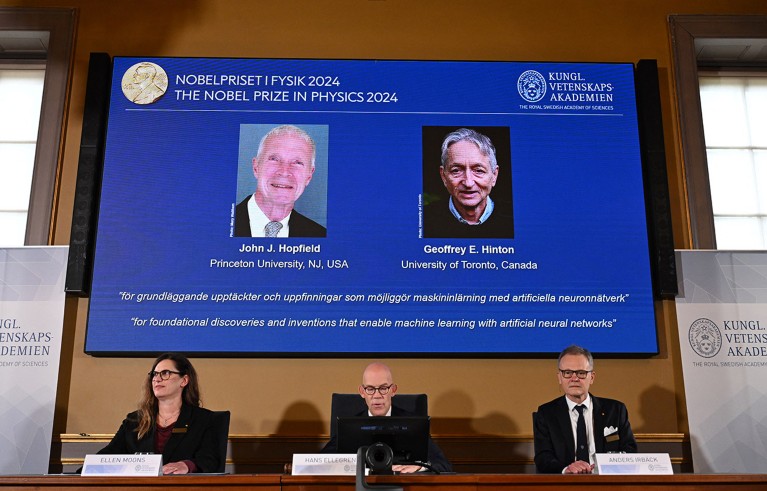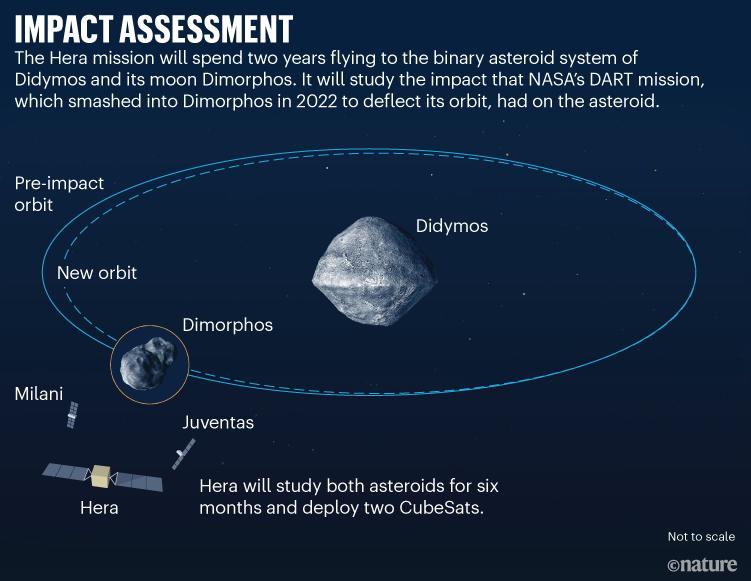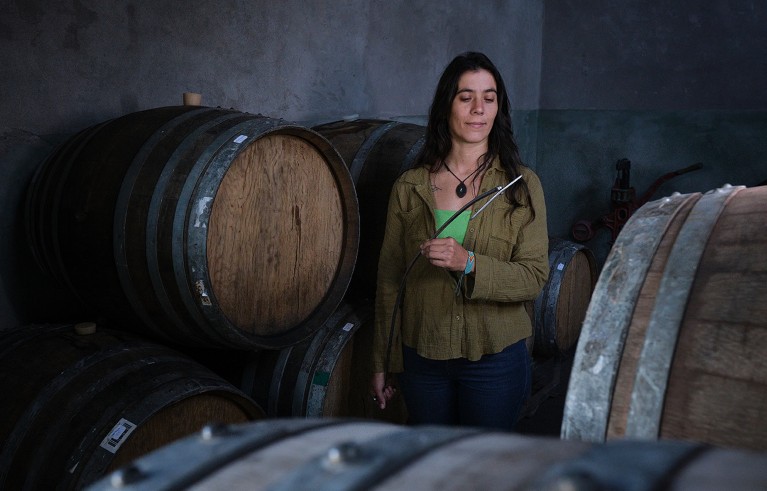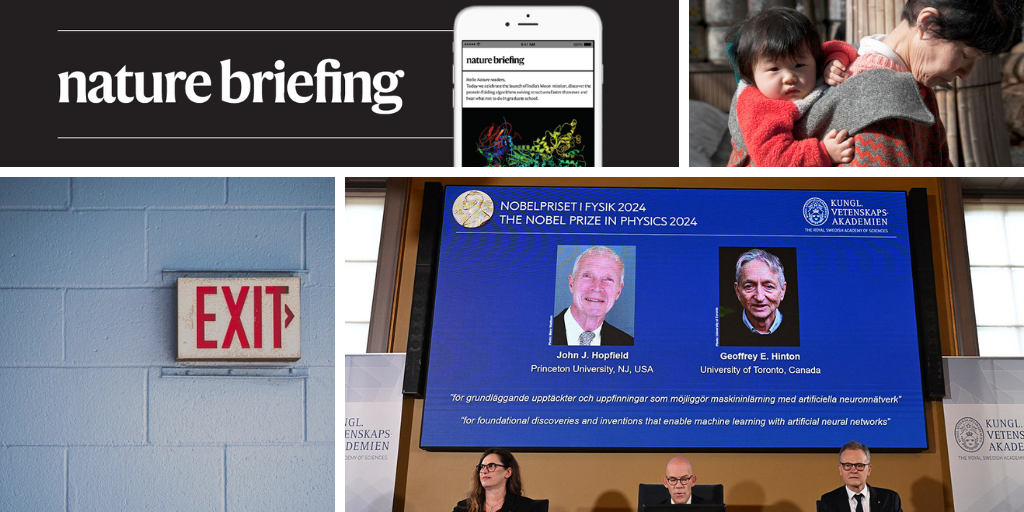Hello Nature readers, would you like to get this Briefing in your inbox free every day? Sign up here.

The winners were announced by the Royal Swedish Academy of Sciences in Stockholm.Credit: Jonathan Nackstrand/AFP via Getty
The Nobel Prize in Physics has been awarded to John Hopfield and Geoffrey Hinton for their work in developing tools for understanding the neural networks that underpin artificial intelligence. In 1982, Hopfield, a theoretical biologist with a background in physics, came up with a network that described connections between virtual neurons as physical forces. It became known as ‘associative memory’, because it evokes the process of trying to remember a word or concept based on related information. Hinton, a computer scientist, later used principles from statistical physics, which is used to collectively describe systems made up of too many parts to track individually, to further develop the ‘Hopfield network’. These artificial neural networks were different from other types of computation because they learn from examples, including from complex data, that would have been challenging for conventional software based on step-by-step calculations.
The radical increase in human life expectancy that occurred during the 20th century might be tailing off. An analysis 30 years in the making found that, in rich countries, lifespans lengthened at a slower rate in the decade starting in 2010, compared to the years after 1990. “There are limits to how far out we can push out the envelope of human survival,” says epidemiologist and co-author S. Jay Olshansky. “If you live long enough, you run up against the biological process of ageing.” Others say we could take a more optimistic view. A century ago, few researchers would have thought that health advances could slash child mortality from more than 20% in 1950 to less than 4% now, says demographer Dmitri Jdanov.
Reference: Nature Aging paper
Read an expert analysis by demographers Dmitri Jdanov and Domantas Jasilionis in the Nature Aging News & Views article (9 min read)
A third of researchers quit science within five years of authoring their first paper and almost half leave within a decade. Researchers looked at the scholarly-publishing data from Scopus for nearly 400,000 scientists across 38 countries. Overall, women were more likely than men to stop publishing, though this varied between disciplines. This gender gap has narrowed with time, but could be much larger than data suggests, notes sociologist Joya Misra. “A lot of times, women aren’t recognized as collaborators on published work.”
Reference: Higher Education paper
The European Space Agency’s Hera mission launched yesterday to assess how effectively we could protect Earth from an asteroid impact. The solar-powered spacecraft will visit Dimorphos, an asteroid struck (on purpose) by the DART spacecraft in 2022. That impact shortened the period of its nearly 12-hour orbit around another asteroid, Didymos, by 33 minutes. That’s strong evidence that space agencies could, in future, use a similar approach to deflect an asteroid on course with Earth, say researchers. “Hera is a detective, like Colombo,” says planetary scientist Patrick Michel. “It’s going back to the crime scene and telling us what happened, and why.”

Source: ESA/NASA/A. F. Cheng et al. Nature 616, 457–460 (2023).
Features & opinion
“Democracy is the worst form of government, except for all the others,” quoth statesman Winston Churchill. But which is the least-worst form of democracy? This ‘super-election year’, in which as many as two billion voters will go to the polls, could give political scientists the perfect opportunity to find out. Comparing ‘majoritarian’ systems (such as ‘first past the post’) to proportional-representation systems (in which results reflect vote share) — or mixtures of the two — can help scientists explore whether some approaches are more likely to promote democratic resilience or to stave off corrosive partisanship.
As we meet the newest Nobel laureates, science historian Dava Sobel considers the legacy of Maria Skłodowska (known as Marie Curie) beyond her two prize wins. In her new book, Elements of Marie Curie, Sobel “beautifully illuminates the science and the scientists that Curie devoted her life to developing”, writes chemist Michelle Francl. In sketching the lives and careers of Curie and the nearly two dozen women that passed through her lab, Sobel doesn’t sidestep the overt misogyny of the time, but paints a detailed, poignant new portrait of one of the most renowned scientists of the last century and her academic descendants.
Bila-Isia Inogwabini is a Congolese environmental scientist. At 59, he’s training local researchers to succeed him, as their cultural knowledge and language skills can lead to better quality research in the area. That research is vital to the long-term survival of the Congo River Basin rainforest, the second largest in the world, and the diverse ecosystems it houses. But in the Democratic Republic of the Congo, a low-income country, convincing trainees to stay in research, or in the country, rather than pursuing more lucrative career prospects elsewhere is a major hurdle yet to be cleared.
Where I work

Micaela Kuri is an oenologist at Stella Crinita in the Uco Valley, Argentina.Credit: Karl Mancini/Pulitzer Centre
Oenologist Micaela Kuri was inspired to pursue winemaking by the annual grape harvests of her childhood in the Mendoza region of Argentina, where wines have been made since the nineteenth century. She specializes in holistic and integral agriculture at winery Stella Crinita, juggling fieldwork, beekeeping and fungiculture as she designs and plans the production of beverages. “For me, biodynamic agriculture and food production embody a way of life,” she says. “It is important for people to understand the relationship between soil life, water purity and the production of truly nutritious food — and the impact that has on our physical, mental and emotional health.” (Nature | 3 min read)
Today I’m speechless looking at this image of ocean-spanning Hurricane Milton captured by astronaut Matthew Dominick from the window of a space capsule docked at the International Space Station. Equally affecting is another view from a window — this time much closer — taken from one of the US National Oceanic and Atmospheric Administration’s ‘hurricane hunter’ aircraft as it flies into the storm to gather research data. I take my hat off to the courage of these researchers, and my thoughts are with everyone affected by extreme weather.
Thanks for reading,
Flora Graham, senior editor, Nature Briefing
With contributions by Jacob Smith
Want more? Sign up to our other free Nature Briefing newsletters:
• Nature Briefing: Careers — insights, advice and award-winning journalism to help you optimize your working life
• Nature Briefing: Microbiology — the most abundant living entities on our planet — microorganisms — and the role they play in health, the environment and food systems.
• Nature Briefing: Anthropocene — climate change, biodiversity, sustainability and geoengineering
• Nature Briefing: AI & Robotics — 100% written by humans, of course
• Nature Briefing: Cancer — a weekly newsletter written with cancer researchers in mind
• Nature Briefing: Translational Research — covers biotechnology, drug discovery and pharma


